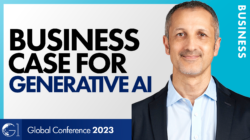Leading High Performing Remote Teams
How can leaders ensure that performance remains high in remote or hybrid-work environments?
Content Marketing
In this course, you’ll learn how compelling blogs, videos, podcasts, and other media can reach customers and drive sales. You’ll also learn steps for creating an effective content marketing plan, and some important ways to measure its impact and success.
Content marketing is a essential digital marketing strategy for companies looking to provide relevant and useful information to support your community and attract new customers.
Get started on your content marketing journey today.
Sustainable Innovation in Times of Disruption: Choices for a Better Society
There are opportunities for progress all around us. The key is to innovate on these opportunities sustainably.
To help identify most effective path forward, you'll need to gain a global perspective to these challenges in an open discussion. How can Japan and the world take action to create a more sustainable, innovative world? Where do you fit in?
It's time to find out.
Social Media & Digital Communications: Impact on Global Public Opinion
Social and digital media have dominated the communications industry for decades. But it's no secret that social media has the power to sway public opinion, and the way in which many companies use these platforms could be seen as manipulative.
What do companies need to be aware of when utilizing social and digital media? How can these mediums be used to better communicate strategically with the world?
Discover what top media and communications experts have to say.
CAGE Distance Framework
Want to expand overseas? The CAGE distance framework can help ensure you're constructing a solid global strategy in four areas: cultural, administrative, economic, and geographic. Learn how to leverage useful differences between countries, identify potential obstacles, and achieve global business success.
Servant Leadership
There's more to leadership than driving a team to profit. In fact, there's a word for looking beyond self-interest to prioritize individual growth: servant leadership. Try this course for a quick breakdown of what that is, how it works, and how it can lead to organizational success.
Strategy: Creating Value Inside Your Company
Have you ever wondered why certain companies are more successful than others? The answer is strategy: internal processes that control costs, allocate resources, and create value. This course from GLOBIS Unlimited can give you the tools you need for that strategic edge.
Strategy: Understanding the External Environment
To plan strategy on any level, you need to understand your company's external environment. In fact, your level of understanding can impact hiring, budgeting, marketing, or nearly any other part of the business world. Want to learn how to do all that? This course from GLOBIS Unlimited is the perfect first step!
Using Japanese Values to Thrive in Global Business
Japanese companies have unique cultural, communication, and operational challenges. But they also have values that have led to remarkable longevity. Check out this seminar to hear how these values help earn trust from overseas head offices and develop employees.
Marketing: Reaching Your Target
Every company works hard to get its products into the hands of customers. Are you doing everything you can to compete? In this course, you’ll find a winning formula to turn a product idea into real sales. Follow along through the fundamentals of the marketing mix and see how companies successfully bring products to market.
Basic Accounting: Financial Analysis
Want to compare your performance vs. a competitor? Or evaluate a potential vendor? Then you'll need to conduct a financial analysis. This course will teach you how to use three financial statements and evaluate financial performance in terms of profitability, efficiency, soundness, growth, and overall strength.
Career Anchors
What drives you to be good at your job?
Career anchors are based on your values, desires, motivations, and abilities. They are the immovable parts of your professional self-image that guide you throughout your career journey.
Try this short GLOBIS Unlimited course to identify which of the eight career anchors is yours!
Leadership with Passion through Kokorozashi
The key ingredient to success? Passion.
Finding your kokorozashi will unify your passions and skills to create positive change in society. This GLOBIS Unlimited course will help you develop the values and lifelong goals you need to become a strong, passion-driven leader.
On the surface, writing a resume doesn’t seem like much of a challenge. After all, it’s just a list of your previous job experience, right? How hard could it be?
But if you’re one of the millions of people who’ve sent countless job applications and received little (or no) response, it could be time to reevaluate your strategy. Learning how to write a resume will help gets you noticed—for the right reasons.
The importance of a well-written resume is one of the most overlooked parts of the job hunting process. Sure, a successful interview may be what actually lands you the job, but it’s not what gets your foot in the door. That comes down to a single page that the average recruiter spends just five to seven seconds looking at. If you want more than those few seconds, it’s essential to know how to write a resume that catches their attention—and holds it.
Chris Frost, founder and APAC CEO of Cogs Agency, joins us to share what recruiters like himself want to see when they review resumes. Here are some red flags recruiters look for, common myths to avoid, and other tips for how to write a resume tailored to the job of your dreams.
“Putting your CV in front of the right person, you’re going to maximize your chance of gettng an interview.”
Chris Frost
Transcript:
What are the biggest resume red flags?
Chris Frost:
If we talk about . . . the problems within CVs generally that can turn off employers, [there are] obvious things like too much information. If you can’t get your CV on to two pages, or one page if you’re junior, you’re probably saying too much. There’s too much repetition. So when you read the content of the CV, you’re kind of repeating the same skills and experience.
I think some things to be aware of when you’re creating a CV is making it relevant to the role. You’ve got to think about the person that’s reviewing your CV and convey your experience and skills quickly and succinctly enough for them to be able to absorb what you could do for their organization. Bear in mind that the hiring manager is probably going to review thirty to fifty CVs for a role. And if your CV is too long, has spelling mistakes, is not clear that you have the right experience to be able to take on the role, they might immediately move away from your profile and put you in the maybe or the no [pile].
So tailoring your CV and really checking for things like spelling mistakes, formatting errors—these are really basic things that are a massive turnoff to hiring managers. Putting the right CV in front of the right person, you’re going to maximize your chance of getting an interview.
What are some common resume myths?
Frost:
I often read CVs that will say a variation of, “I’m team playing, go getting, problem solving, with great attention to detail.” And I’ve just spent three minutes really not learning anything about the person at all and just reading a bunch of words. And so I think the idea of a personal statement on a CV is a little dated.
It . . . could be replaced with either a personal mission that’s genuine about what I’m looking to achieve in my career [or] what I’d be looking for within the company I’m applying to. Remove some of those more conflated, expansive words about how wonderful and great you might be.
Next Article
7 WORST Pieces of Interview Advice You Should Avoid
7 Presentation Skills to Give You an Edge in Your Next Job Interview
How to write a resume that stands out
Frost:
I think when you’re creating a CV, you need to write with some authenticity and be clear about your experience and skills. The older view is, “What can I say to this employer in the interview and through my document that’s going to get me the job?” And so I’ll be using these expressions, like “team player” and “great time management.” But really, whilst they’re kind of relevant, they don’t tell you very much about the individual.
So the idea of being clearer in your CV about where your skills lie and what you’re good at—and being more authentic—I think has a greater attraction for employers and will separate you from those other profiles that have used more generic and obvious soft-skill expressions that everybody seems to have on their CVs.
Are basic PC skills worth listing?
Frost:
Whether you should include basic PC skills on your CV—I think it’s a given that most people now have those skills. And again, it comes down to putting content on there that is relevant and interesting. And if 20% of your content is about skills that everybody is expected to be able to have, you know, using Microsoft Word or being able to use email packages—these are givens. Including that as a kind of hard skill [is] probably irrelevant.
Obviously, if you’ve got more advanced skills with software packages—maybe in Excel you can create complex code to be able to do sums—then absolutely, you should mentioned those. But you wouldn’t put down, “I can use Microsoft Excel” because I think it would be a given that anybody that’s worked in an office or been to school probably would have those skills and experience already.




